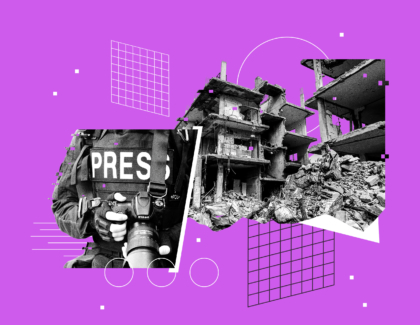Sign up for the daily CJR newsletter.
The recent surge of insurgent attacks in Iraq seems to have hit a nerve in the world of the newsweeklies.
Time‘s Aparisim Ghosh brings us “A Day in the Life Of a Baghdad ER.” Dr. Jalal Taha Emad is the story’s Dr. Carter, minus Maura Tierney, minus the fancy medical tools. Time reports: “Prepping the ER is a simple business; there is not much to get ready. Apart from their stethoscopes, the only diagnostic tool available to the surgeons is a Soviet-era X-ray machine. Ultrasound equipment? No. CT scans? No. MRI? No.”
Also, no need for a phone call alerting the Dr. Emad of incoming wounded. On a morning that two of Time‘s Iraqi staffers were wounded, “[t]he explosion could be heard two miles away in the Yarmouk Hospital. Dr. Jalal Taha Emad told his crew to prepare to receive the wounded. ‘I heard the explosion in the distance,’ he says, ‘and I guessed that the ER was going to get very busy.'”
It turned out that Time‘s staffers were the only serious injured of the day, and, therefore, Dr. Emad and his staff were able to save them. We later learn that Time transferred the staffers to a cleaner, private hospital before airlifting them out of the country. But others without the bankroll of America’s corporate media aren’t so lucky.
“Don’t ask America’s top brass exactly how the Iraq war is going. They don’t know,” reports this week’s Newsweek. It turns out, the magazine tells us, that the U.S. has “never managed to agree on a unified system for gauging successes and failures in the counterinsurgency campaign.”
System or no system, it’s no leap to say, as Newsweek puts it, that “things are looking grim.”
What about those elections? The American Enterprise Institute’s military expert Tom Donnelly thinks they were “[held] up as a milestone … But as regards [to] the insurgency, they’re evidently not particularly relevant at all.”
The fight goes on and, at least in some corners of Iraq, it goes on with improved synergy. “Before Fallujah, Tawhid and Jihad (insurgent groups) worked alone,” one fighter told Newsweek via intermediaries last week. “It’s true that we lost the battle of Fallujah, but that loss united the resistance groups.”
The Iraqi insurgency earns “Special Report” status in the Economist. The magazine kicks off its piece (subscription required) with a string of body counts. May 4 brought 60 dead and 150 wounded. Thirteen dead the next day. A week earlier, 50 lives taken in 17 car bomb attacks — not to mention the 57 bodies found in the Tigris River south of Baghdad.
Like Newsweek, the Economist shoots down the fading idea that the elections represented a victory against the insurgency. In retrospect, it appears the insurgents were just biding their time during a period of increased policing, while rearming for the recent spate of attacks.
“Either way,” the Economist writes, “the insurgency has lost none of its potency in the short term. Nor is there any dispute about the insurgents’ improved professionalism. Recent attacks in Baghdad and Mosul — the first and second cities in Iraq and the most violent — have featured several staggered blasts, aimed to kill and maim both the initial targets and their rescuers.”
Unemployment is only exacerbating the situation. Sure, some professionals, like civil servants, have seen a spike in salary. But for every civil servant there is a former Iraqi army officer scraping to make ends meet. It’s “no surprise, therefore, that a pool of candidates stands ready and willing to ambush passing marine patrols for a few hundred dollars.”
Yes, there is a new government, but as the Economist reminds us, “This government’s main task, however, is not to sort out the country, but to set up a permanent version of itself. … Meanwhile, at least in the short term, the insurgency seems not dispirited but emboldened by each faltering step toward democracy.”
Switching gears, The Weekly Standard investigates an Al Jazeera and UN oil-for-food conspiracy. Playing off of a recent documentary that aired on Al Hurra — a U.S.-funded Arabic satellite network — the Standard details shady dealings between Uday Hussein and Al Jazeera. The article alleges that Al Jazeera reporters Mohammed Jassem al-Ali and Hamida Naanaa received lucrative oil coupons in exchange for pro-Saddam coverage.
The Standard authors lend some space to a discussion of how Arabic media should be shaped. The best idea comes in the concluding paragraph: “This kind of corruption confirms the need for unbiased media in the Arab world. Some writers — including Reuel Marc Gerecht in these pages — have called for the creation of an Arab or Iraqi C-SPAN, a station that would broadcast unfiltered political debate of interest to the Arab world, and so serve as a means of education about the democratic process.”
Mouafac Harb, Al Hurra’s director of network news and executive vice president — who, by the way, told the Standard that the documentary about Al Jazeera was not provided by the U.S. government — envisions a competitive media market in Arab nations that will ultimately lead to news that is free from government meddling.
Someone run that by Armstrong Williams and see if he thinks that’s the answer.
–Thomas Lang
Has America ever needed a media defender more than now? Help us by joining CJR today.






